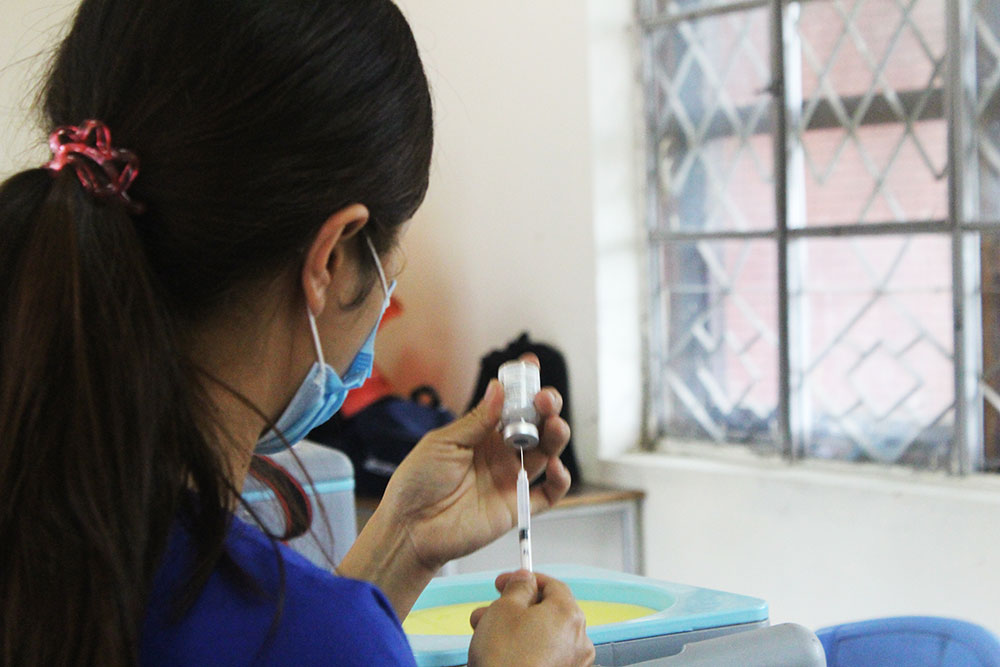Impact on science, vaccine supply and global intellectual property rights
The ongoing Covid-19 pandemic continues to shape the socio-economic, political, and technological landscape in the fight to stop the spread of the virus. Bhutan’s responses to Covid-19 and the success it has achieved are worth sharing with the world. In particular, vaccine rollout strategies and the vaccination campaign has attracted global attention. Within a three-week time in March 2021, 61 percent of Bhutan’s population received the first round of their vaccines, matched only by Israel at the time. The accomplishment of rapid rollout of vaccines was achieved despite Bhutan lacking a domestic pharmaceutical manufacturing industry. India’s generous donation of vaccines to Bhutan and neighbouring countries in the region played a major role in the success of the rollout.
In the first round, Bhutan had administered mostly Covishield doses received from India. The spike in the Covid-19 cases increased both in the region and worldwide with new variants of the virus which severed vaccine supply. Bhutan faced a conundrum over the uncertainty of the second round of vaccines given the shortage of supply worldwide. Moreover, time was running out to administer the vaccines with the prescribed time gap of 16 weeks between the first and second rounds of vaccination. Fortunately, many countries came forward to donate to Bhutan for the second round well before the recommended time frame widened; some of the countries are the United States, Denmark, China, and also India. The second dose of vaccination in Bhutan will constitute different vaccines, however. The vaccines are AstraZeneca, Moderna, Pfizer, and Sinopharm.
First, the question of mix-and-match of vaccines is as much of interest to the general public and policymakers, given the different types of vaccines now available, as to the health professionals worldwide. The vaccination strategy of mix-and-match now adopted by Bhutan will hugely impact global science. Many countries are divided over the idea of mixing vaccines; however, an equal number of countries are also advocating mixing vaccines to increase immunity against the Covid-19 virus. Although Bhutan has announced that people can opt for vaccines of their choice, it is clear that the situation of different vaccines at disposal and consequent efficacy rates from the vaccine mixing for a large number of people will contribute to the much-needed scientific basis.
Second, many countries like Bhutan, lacking a local pharmaceutical manufacturing industry, depend on donor countries for medicines and medical technologies like vaccines. Covid-19 is an ongoing pandemic, and this means that only a handful of countries with advanced research and development facilities and capabilities can manufacture and supply Covid-19 vaccines. At present, there is a global petition at the World Trade Organization (WTO) led by India and South Africa and supported by more than 100 countries proposing for a waiver of intellectual property rights temporarily to facilitate vaccine manufacture, rapid distribution, and supply to countries who are not able to manufacture vaccines themselves. Vaccine supply and distribution are not at all possible if technological know-how, data, resources, and investment on the Covid-19 vaccination are withheld from larger public interests which are at stake at the moment. Protection of human health and well-being must triumph over anything else. The legal measure of medical technologies like Covid-19 vaccine by patents, trademark or trade secrets, or other intellectual property rights is stalling the efforts to deal with the pandemic. Bhutan’s plea for the second round of vaccines and the timely donation from donor countries is real-world practical evidence in support of waiving off restrictive legal and regulatory systems that function to override global health crises.
The death toll from the Covid-19 pandemic is rising globally. There is a genuine need for rapid vaccine rollout and treatment of patients both in developed and developing nations. Bhutan and Covid-19 and the way vaccines have been rolled out amidst practical challenges and supply uncertainties as well as the forthcoming support of donor countries is a clear message to the global community that both science and law can be worked out favourably to deal with the pandemic like Covid-19.
Disclaimer: The views expressed in this article are author’s own.
Contributed by
Kencho Peldon
University of Queensland, Brisbane, Australia


